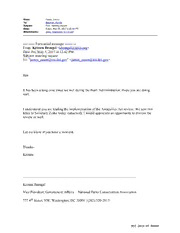
2018 07 Release Set 2 Doc 24 PDF
Preview 2018 07 Release Set 2 Doc 24
From: Cason, James To: Bowman, Randal Subject: Fwd: meeting request Date: Friday, May 05, 2017 1:28:54 PM Attachments: Zinke EOprocess 5.5.17.pdf ---------- Forwarded message ---------- From: Kristen Brengel <[email protected]> Date: Fri, May 5, 2017 at 12:42 PM Subject: meeting request To: "[email protected]" <[email protected]> Jim- It has been a long time since we met during the Bush Administration. Hope you are doing well. I understand you are leading the implementation of the Antiquities Act review. We sent this letter to Secretary Zinke today. (attached). I would appreciate an opportunity to discuss the review as well. Let me know if you have a moment. Thanks- Kristen ------------------------------------------------------------------------------------------------ Kristen Brengel Vice President, Government Affairs | National Parks Conservation Association 777 6th Street, NW, Washington, DC 20001 | (202) 320-2913 DOI-2018-07 00800 The Honorable Ryan Zinke U.S. Department of the Interior 1849 C Street N.W. Washington, DC 20240 May 5, 2017 Dear Secretary Zinke: On April 26, 2017, the Trump administration took unprecedented steps to issue an Executive Order targeting the Antiquities Act. Aside from the Organic Act, no law has had greater influence on the National Park System than the Antiquities Act. Since 1919, the National Parks Conservation Association (NPCA) has been the leading voice of the American people in protecting and enhancing our National Park System. On behalf of our more than 1.2 million members and supporters nationwide, I write in support of the Antiquities Act and to inquire about the Department of Interior’s process and implementation of national monument reviews as laid out in Executive Order. For over one hundred years, the Antiquities Act has been used as a bipartisan conservation tool. The law was created by Congress to allow the president to permanently protect federally owned historic landmarks, historic and prehistoric structures, and other objects of historic or scientific interest as national monuments. The Antiquities Act has been used by eight Republican and eight Democratic presidents, who have designated a total of 157 national monuments under this authority. This includes nationally significant cultural, historical, and natural sites such as, the Grand Canyon and Acadia National Parks, Statue of Liberty and Muir Woods National Monuments, and the Chesapeake and Ohio Canal National Historical Park. In fact, many of our nation’s most popular and iconic national parks were first protected using the Antiquities Act. More recently, the Antiquities Act has help safeguard and honor more diverse stories in the National Park System through the designations of Stonewall, Belmont-Paul Women’s Equality, and César E. Chávez National Monuments. Imagine what our country would be like without these incredible places, protected just as they should be. According to the Executive Order, as written and available from the White House, your office is responsible for reviewing national monument sites designated after January 1, 1996 that are more than 100,000 acres, or where you determine the designation or expansion was made without “adequate public outreach and coordination with relevant stakeholders.” While NPCA, like hundreds of other organizations, is deeply troubled by the premise of this Executive Order, we are also unclear how the review will be executed. Based on the Executive Order alone, it is unclear how many monuments will be considered for review, how many will actually be reviewed and what the process for that review might be. DOI-2018-07 00801 As your office undertakes the Executive Order on the Antiquities Act, with the 45 and 120-day reporting requirements quickly approaching, NPCA would appreciate your clarification on the following issues: 1. Which monuments designated after January 1, 1996 will be under review? 2. How exactly will you determine if the national monument designation or expansion was made “without adequate public outreach and coordination with relevant stakeholders”? 3. How will your office’s decisions for 1. and 2. above be made public? 4. Will there be formal stakeholder engagement or public comment opportunities prior to the 45 and 120-day reporting periods required by the Executive Order? 5. How will the National Park Service (NPS) and other land management agencies be engaged and consulted during the review process? Will they provide written comments? 6. Once reviews of national monuments are completed, how will the reports (at 45 and 120- days) be shared with the agencies and with the public? 7. Following the submission of reports to the Office of Management and Budget, how will your department pursue the recommendations included in the report(s)? Will there be a special executive team to fulfill the recommendations, should you have any? As you know, national monuments are very popular with the American public. The Colorado College’s Conservation in the West Poll found 80% of western voters support keeping existing national monuments protections in place while only 13% of western voters supported removing protections for existing monuments. This poll reinforces other surveys that document widespread public opposition to congressional attacks on new parks, including a December 2014 Hart Research Poll where 90% of Americans support the permanent protection of some public lands, monuments, wildlife refuges and wilderness. Because of the near universal support of our nation’s monuments, it is imperative that our public land and water management agencies maintain a transparent process when considering their review. Thank you for your consideration and clarification of how your office will engage with the April 26, 2017 Executive Order on the Antiquities Act. We look forward to hearing back from you. Sincerely, Theresa Pierno, President & CEO DOI-2018-07 00802
